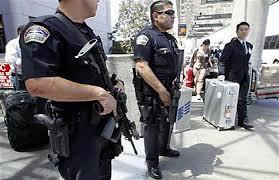TerrorismU.S. tightens scrutiny of U.S.-bound airline passengers
Roughly 1,000 of the 4,000 fighters who traveled to Syria and Iraq to join ISIS carry passports of one of the thirty-eight Visa Waiver Program countries – countries whose citizens do not need a visa to enter the United States. U.S. officials are now reviewing methods used to screen airline passengers with passports from Visa Waiver countries before they board U.S.-bound flights.

Scrutiny and security measures to tighten // Source: zaiocity.com
U.S. officials are reviewing methods used to screen airline passengers with passports from Visa Waiver Program countries before they board U.S.-bound flights. DHS chief Jeh Johnson said concerns about a potential terrorist attack on the United States by Western Jihadists have raised the alarm for airport security officials throughout Europe. More than 4,000 foreign fighters have traveled to Syria since a civil war began there in 2011. Roughly 1,000 of those fighters are with European or other passports which allow easy entry to the United States. Now U.S. customs officials are assessing check systems at airports “to ensure that they are adequate,” Johnson said at the Council on Foreign Relations in New York City. He adding that more than 100 Americans have traveled or attempted to travel to Syria to join rebel groups including the Islamic State.
The Los Angeles Times reports that U.S. officials are concern that Western Jihadists may attempt to blow up a jetliner or enter the United States to launch an attack. Under current travel rules, passengers from England, France, Germany, and thirty-five other countries whose citizens can travel to the United States without a visa, simply have to complete an information form seventy-two hours before they depart. Not all forms are checked for accuracy, however, so some security officials are calling for better inspection of travelers. Since July, the United States has increased the screening of passengers and carry-on luggage in twenty-five airports with direct flights to the United States. “We need to ensure we are doing all we can to identify those who, by their travel patterns, attempt to hide their association with terrorist groups,” Johnson said.
At next week’s United Nations annual General Assembly session in New York City, President Barack Obama will lead a Security Council meeting, where he is expected to seek a UN resolution requiring countries to collect and share more information about the travel of foreign fighters. Johnson did note that U.S. intelligence agencies have no credible information that IS is planning an attack on the United States, but “we know ISIL views the United States as an enemy, and we know that ISIL’s leaders have said they will soon be in ‘direct confrontation’ with the United States,” Johnson said.
Security officials are especially concerned about independent terrorists who may already be in the United States and may launch an attack without direct orders from a foreign terrorist group. “We are continually on guard against the potential domestic-based, homegrown terrorist threat who may be lurking in our society,” Johnson said. “In many respects, this is the hardest threat to detect.”
